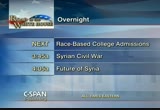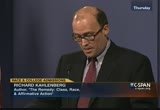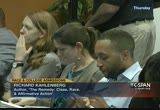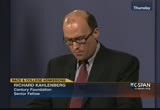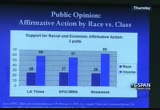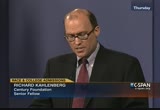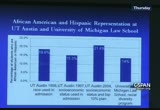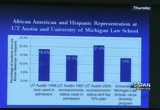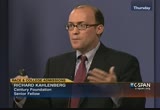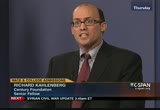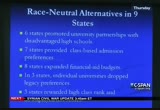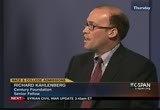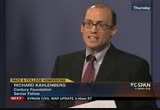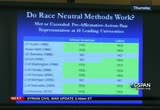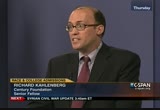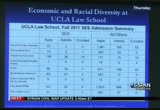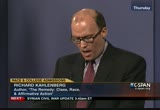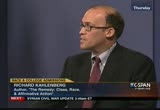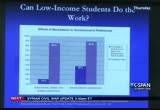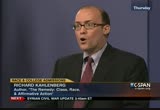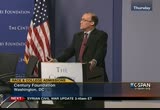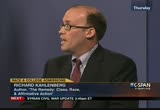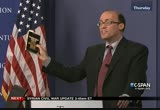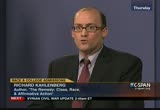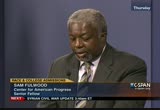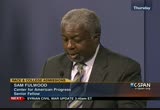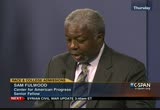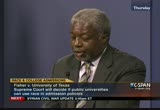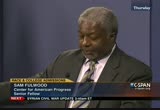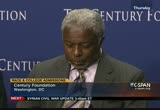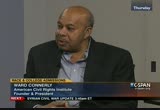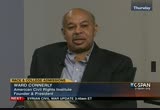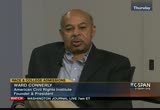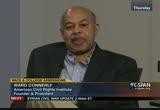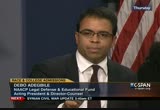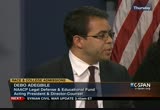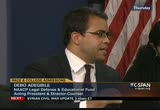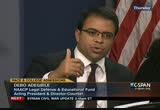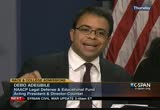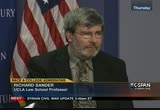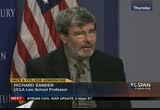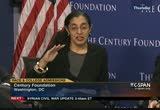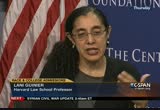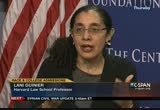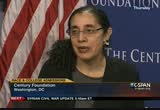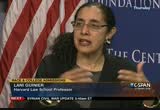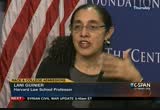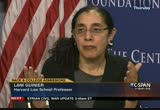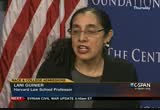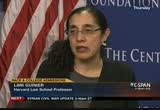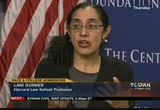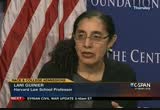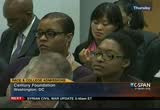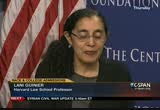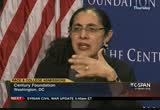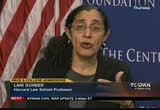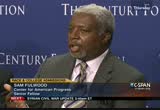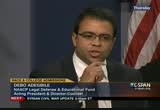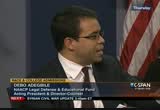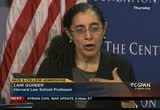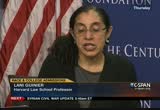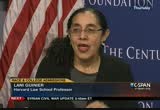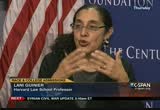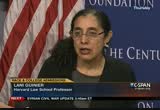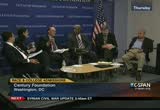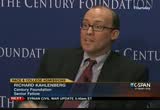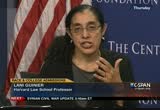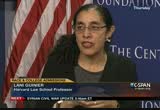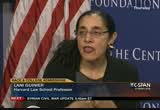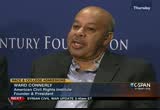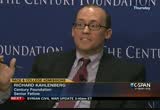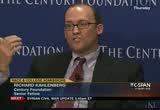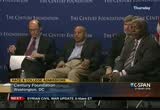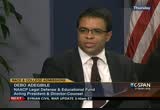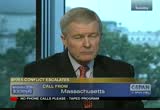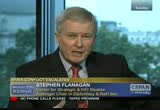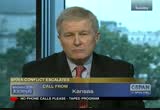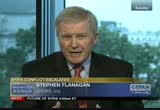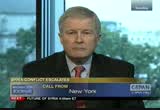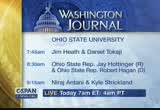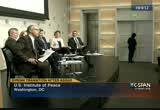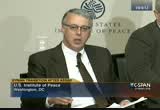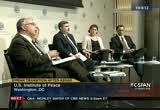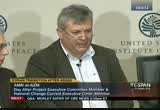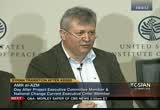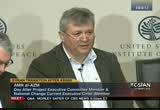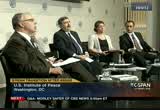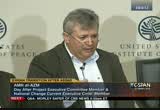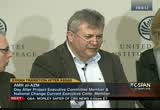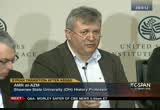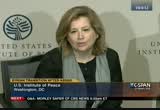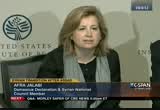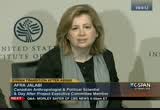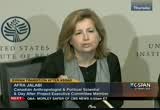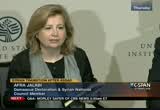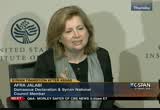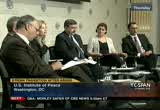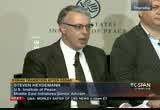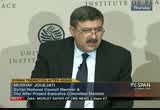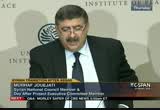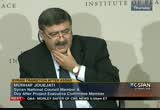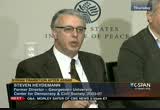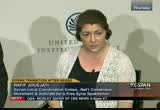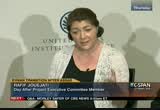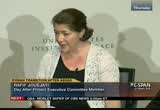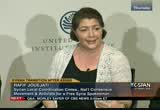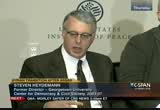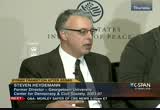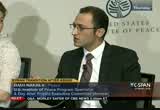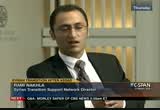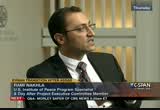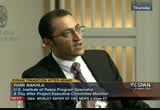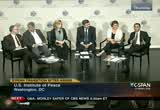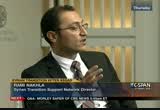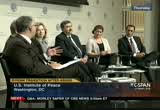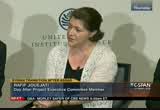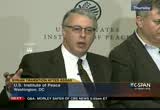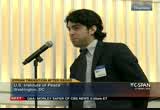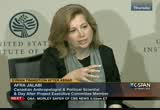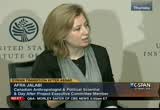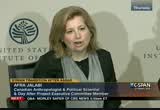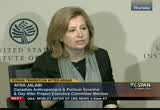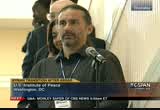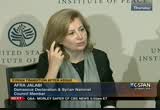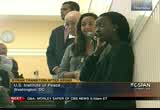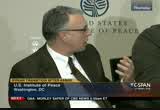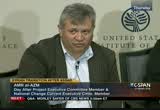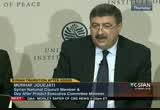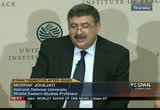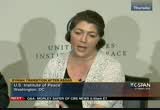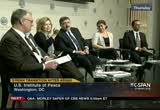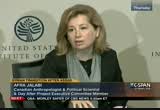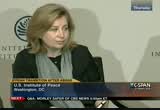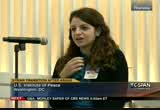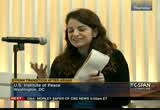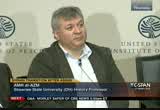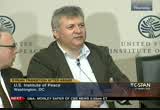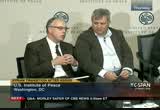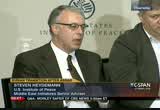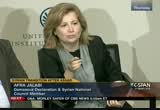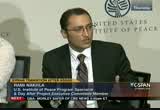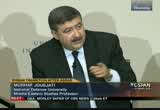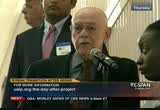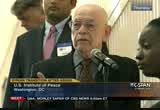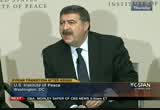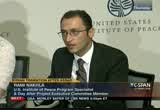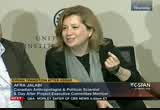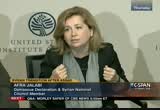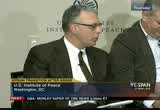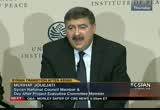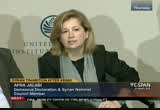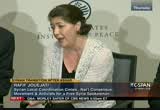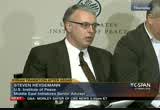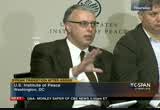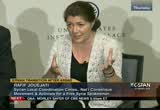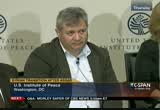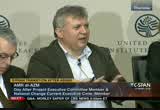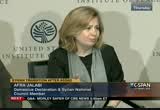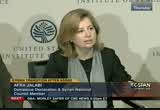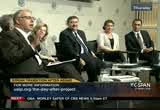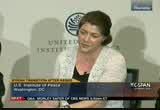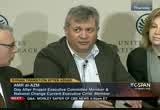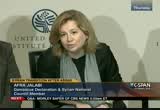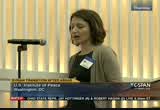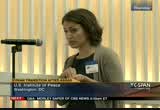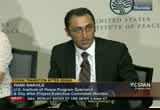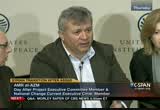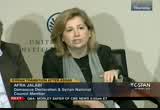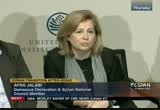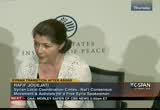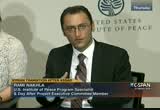tv Washington This Week CSPAN October 8, 2012 2:00am-6:00am EDT
2:00 am
>> congressman murphy and i agree that the choice between late term care and and care ought to be between families and physicians. unfortunately, the affordable health care act takes that away and puts panels and between the patient and doctor. that is something i do not agree with in our health-care law. that's one of the reasons i oppose it. these are times we have to look at what is best for everyone to have the best kind of health care they can have. i believe in preventive health care and let me just address one thing before -- let me digress for a second. i have never said i'm for privatizing social security or our medicare plans. that's clearly not my thing. congressman murphy knows that has to be honest about that. i will support continuing reform to social security and medicare simply prolong it for our generation. congressman murphy voted to take
2:01 am
2:02 am
it is being taken out of the pockets of drug industries and drug companies who are making billions of care for seniors. if you are going to be serious about reducing the rate of growth of medicare, which you have to beat, then you have to be willing to say we're going to end the subsidies to insurance companies and drug companies who don't need our money when seniors to. >> in north carolina, your home state, gay marriage is banned and here in connecticut, gay marriage is legal. which state got it right? >> i have lived in connecticut and i absolutely support america's law for same-sex marriage. i would not pretend to try to impose my will on others. i sing everyone should have the freedom to make that choice. >> america does not have a law protecting same-sex marriage. in fact, it has the exact opposite. the united states has a law that doesn't allow people to marry based on their choice. it discriminates against individuals based on their sexual orientation.
2:03 am
i think the fact that linda mcmahon spent only 20 seconds answering that question tell you she's not going to stand up to her party in washington when it comes to these issues that are being dominated by the social right in washington. there is a war being waged against gays and lesbians and i'm proud to stand on one side of that war. i'm proud to stand up to end the don't ask, don't tell policy, and not produce and for the idea that anyone in this country regardless of their sexual orientation should be treated the same. that's going to the fight i continue. but the shortness of that answer suggests linda mcmahon is not going to stand up to the social right in her party which is trying to destroy the rights of gays and lesbians and also trying to destroy the rights of women in this country and take away their ability to choose for themselves what they want to do with the body and an coverage for family planning services and reproductive health care services.
2:04 am
i'm going to fight that social right whether it signed a rights or women's rights every day i'm in the united states senate. when the mcmahon, as a republican, is simply going to be another vote to empower it. at the critical difference. >> mr. murphy, you voted with your party 90% of the time. i am independent thinker. i will differ from my party on particular issues. >> on that one? on the issue of civil rights? >> i will absolutely differ from my party. i am pro-choice candidate, i believe in equal rights for all. i would have voted to repeal don't ask, don't tell. i don't think we should have discrimination in the military, the workplace or anywhere. >> our next question is to mr. murphy. >> knowing that voters form their opinions based on political ads, how can you
2:05 am
justify airing ads that in some cases have been determined by fact checkers to be misleading, confusing, and downright inaccurate? >> the ads that you see on tv for me right now are me in my kitchen talking to voters directly about the differences between me and linda mcmahon on critical issues. i support a middle-class tax cut. when the mcmahon includes a tax cut for the very wealthy. when history is standing up for the people in the state, whether it's taking homeless veterans of the street and giving them housing or fighting for the most vulnerable and the roof over their head because of a disability or mental illness. linda mcmahon has used her job a very different way, going to washington to fight for lower protection for workers. those of the issues we should be talking about. it differences between us on the issues we stand for and our
2:06 am
respective professional history. what i don't think voters what are these personal attacks that linda mcmahon is waging against me, my wife, and my family. it's not surprising she's doing it. she tried to do it two years ago with a very serious of personal ads. people in this state what the phrase to be focused on issues. to the extent i am talking about linda mcmahon in my ads, talking about the difference between her and i and the differences that matter to connecticut families. >> you have 90 seconds. >> i think we ought to clearly be discussing the issues. that's why i have bad to talk about my six. plants. talks about tax cuts to the middle-class and reducing taxes for businesses and rolling back overburdensome regulations.
2:07 am
when i've been up to ring are businesses, one business in plainfield, conn. said he was dealing with overregulation, he wanted to double the size of its facilities and put in two new pieces of equipment and hire new employees. he goes to his bank and under the current regulatory environment, as bank took a look at his business plan and said here is your problem -- you are asset rich and cash poor. he said i know that, if i had the cash it would not be here for a loan. he would have to over collateralize a loan by 150% under the current regulatory environment. i want him to be able to grow his business. it's a classic example of regulation killing jobs. we need to make sure we have the proper amount of legislation but not overregulation. my commercials talk about
2:08 am
reducing spending, and powering our work force for training for jobs available and developing a comprehensive energy policy to put our people back to work, energy independence to protect our environment. >> 30 seconds to rebut. >> you have been running some of the most deceitful attack at the state has ever seen. don't try to pretend that has not been what's happening in that race. when your campaign was asked why you don't start talking about the issues, your campaign manager said it would be a senseless exercise. that's right. for linda mcmahon talking at the issues of be a senseless exercise. the only ads she can run are against me and my family. my path is different. that's what in the final four weeks my campaign will be about. >> it's time now with our closing statements. we begin with mrs. mcmahon. i want -- >> i want to thank you once again.
2:09 am
voters in connecticut will have a clear choice in november. a clear choice between a job creator has a plan to create millions of jobs and someone has never created job and does not plan to do that. someone who will raise taxes on the middle class, has voted to do that already, and someone who is going to reduce taxes, a class. someone who desperately wants to put our folks back to work, someone who wants to give an honest representation to the people of connecticut. i think congressman murphy does need to be honest. he needs to be honest about his special interest and special interest loans. i don't have that opportunity to have special interest loans and i would not take special interest money because i cannot be bought. congressman murphy needs to come clean. i would be honored to serve as your united states senator and ask for your vote on november 6.
2:10 am
>> thank you to panelists and our student -- a studio audience. i may not be worth millions like linda mcmahon, but that's because i have dedicated my life to fighting for people in the state. she's going to use her wealth to spend the last few weeks engage in very personal attacks me -- personal attacks against me and my life. here's my message to the people of connecticut -- don't let her do it. make this race be about you. make about the senior citizen who can't have their next senator play games with the next paycheck. make it be about the out of work factory worker who wants a senator who will fight for in sourcing, not outsourcing. make it be about the kid in new britain who can't learn with 30 kids of her class. make this race be about you and set aside the personal tax and lies you see on tv at focus this race on which one of the two of us is going to put you back to work at supportable class.
2:11 am
thank you very much. >> before we say goodbye, we have a yes or no question -- incumbent senators often avoid debates. will you commit right now to debating your opponent in 2018 >> sure i will. >> absolutely. >> we want to thank our candidates tonight. thank you very much for watching. three more debates in this campaign season. have a great sunday. [captioning performed by national captioning institute] [captions copyright national cable satellite corp. 2012] >> tomorrow, live coverage of the u.s. senate debate in virginia between former governors tim kaine and george allen. follow live at -- that begins at 8:00 eastern, followed by the montana senate race at 9:00 between the incumbent and a republican congressman. that is tomorrow on c-span.
2:12 am
see the vice presidential debate this thursday night, live on c- span, c-span radio, and c- span.org. watch and engage. next, a discussion on the future of race as a qualifier for college of mission. then an update on the current situation in syria, followed by a discussion on that nation's future. >> this week, the supreme court hears all arguments in fisher vs. university of texas, which deals with race-based admission policies in colleges and universities. the century foundation released in europe or promoting using class status as a alternative to race-based criteria in admissions policies. they posted this forum. it is about 90 minutes. >> good afternoon, everyone.
2:13 am
thank you all for coming. my name is richard kahlenberg. i am a senior fellow at the century foundation, which is a small think tank with headquarters in new york. we have a small office here in washington as well. it was founded in 1919 by a man whose basement some of you may have visited. i want to recognize the president of the century foundation, who is here today. the report we are going to be releasing was co-authored by me and a research associate at the century foundation who wrote to the back part of the report. in a case of mixed up parties, she decided to go through with her wedding rather than be here today, but she contributed
2:14 am
enormously and want to make sure she is acknowledged. i think studying the issue of affirmative action -- i have been studying it for two decades. in my mind, the central conundrum is that most people of good will want our universities to be racially inclusive, and at the same time many of us are uneasy with the idea of counting race and deciding who gets ahead. moreover, there are some liberals like me who are worried that the narrow focus on racial diversity in higher education has eclipsed larger issues of class and the quality. -- among colleges and universities. so, in advance of the u.s. supreme court's oral arguments in fisher versus university of texas, which will take placenexy
2:15 am
foundation put together a report which i am going to outline which looks at the question, is it possible to create racial and ethnic diversity without using race, and instead paying attention to these large or -- a larger issues of economic equality in our society. it is called "a better affirmative action." it makes three main points. the first, that racial affirmative action is likely on its way out. affirmative action based on race was always meant to be temporary by those who originally envisioned it, a deviation for a period of time away from the non-discrimination principle. but now there are both legal and
2:16 am
political forces that appear to be bringing affirmative action to an aunt. to begin with, -- to a end. -- to begin with, it is highly unpopular among average american voters. if you look at the supreme court briefs in the fisher case, you would think there is overwhelming support for affirmative action, as the number of briefs that outline for a higher education, business officials, civil rights groups, that outlined support for the use of race at the university of texas swamp to the number of priests that are in opposition. -- briefs that are in opposition. but broader public opinion, it appears only about a quarter of the u.s. population supports the idea of racial preferences in college admissions. by contrast, in the second set of figures, the blues set of figures, there is broad support among the same set of voters
2:17 am
for preference in college admissions based on income. given these results, it is not surprising the that ward connerly, who has been on the panel -- will be on the panel, has been extremely successful in his efforts to ban affirmative action based on race in a number of states. so far, the efforts are 546. five out of six times, voters, when given the option, have said we should and the option of racial affirmative action at colleges and public employment, including blue states like california, michigan, and washington. the second major problem facing affirmative-action, of course, is the legal issue, which will be joined in the fisher case. many people expect the u.s. supreme court is going to curtail or even eliminate the ability of universities to use
2:18 am
race in admissions. the court has visited this issue before, in 1978, and then in 2003. both times by a very narrow margin, 5-4, the u.s. supreme court upheld the use of modest racial preferences as the only way to achieve racial and ethnic diversity. justice harry blackmun tennessee said in the 1978 case, i suspect it would be impossible to arrange an informant -- affirmative action program in a racially neutral way and have to be successful. to ask this to be so is to demand the impossible. to get beyond racism, we first must take account of race. there is no other way. but then texas, univ. of texas found that there is another way to create racial and ethnic
2:19 am
diversity. as a set of figures suggest, in 1996, u t austin continued to use race in admissions and had a black and latino representation along the line of 18% combined. in the next year, 1997, university of texas was banned from using race by a lower court decision. they saw a decline in racial and ethnic diversity using socio- economic status alone in their admissions progress -- process. but by 2004, using socio- economic considerations in admissions and what is known as the top 10% plan, where students to graduate in the top 10% of their high school is automatically admitted, you see racial and ethnic diversity,
2:20 am
black and latino representation actually increases above what texas had achieved in 1996. now, we are very clear in the report that part of the reason that there is greater -- there are greater levels of racial and ethnic diversity into a dozen for is that the latino population growth in texas during that time period. as a policy matter, i think it is fair to say that texas ought to be pursuing other race- neutral methods of increasing racial and ethnic diversity so that it more closely mirrors the state's population. as a legal matter, the supreme court has never allowed racial balancing with respect to state why populations. instead, they have said it is ok to use race to create a critical mass of students in -- a
2:21 am
critical mass of underrepresented minority students to have the educational benefits of diversity. you can see from the last figure that the university of michigan law school, where they did use race in admission, had a lower level of -- they considered 14% to be a critical mass, much less than what the university of texas achieved through race- neutral means. i think this goes a long way to explaining why most observers think the supreme court is likely to strike down the use of race at the university of texas. the second question we take up, what should replace race-based affirmative action if it in fact is struck down by the u.s. supreme court? in a report, we look at nine states where, because of voter initiative or executive order or
2:22 am
legislation, univ. -- universities -- they did not give up on diversity and tried to find other ways of achieving racial and ethnic diversity. these plans were hardly perfect, but in many ways there are better than the old style of race-based affirmative action. you can see that in our analysis, six state street partnership with -- partnerships with disadvantaged by schools to increase the pipeline of low- income and minority students. seven of the states provide class-based admission preferences. eight states expanded their financial aid budgets in order to provide support for low- income students of all ages. three states rewarded -- they dropped legacy preferences, which go to the children of alumni. a disproportionate share of whom are white and upper class.
2:23 am
three states rewarded students who did well in their high school, irrespective of test results. to my mind, these are all noteworthy efforts that we ought to applaud. i wish that higher education have more generally adopted these programs. in fact, since 2010, the century foundation published a book decrying legacy preferences, which we called affirmative action for the rich. i think it is a positive note that states have taken some of the steps. in particular, i want to focus on the class a submissions progress. if we want a system of admissions that is truly fair, we would look not only at how well a student does academically, but also what obstacles they had to overcome to achieve their record. you will see that the research
2:24 am
is clear that today disadvantages are far more likely to be based on economic status as opposed to race. this is a study from 2010 which looked at what predicts a student's s.a.t. scores, looking at a large national database. they found it if you are the most social economically disadvantaged, you are expected to score 399 points lower on the s.a.t., the math and verbal s.a.t., then the most social economically advantaged soon. by contrast, the difference between african-american and white students was much smaller, 56 points. essentially, the socio-economic obstacles today, under that analysis, are seven times as large as the racial obstacles. the conflict here is, if you
2:25 am
want to reward students to have beaten the odds and done better than expected, we ought to pay much more attention to socio- economic status. what were the results in terms of diversity, and in particular, racial and ethnic diversity? our analysis, we looked at 10 leading universities in the states where affirmative action was banned or where universities ceased to use racial admissions. in seven of 10 cases, justice blackmun was wrong. there were alternative ways to create racial and ethnic diversity. at u t austin, texas a&m, univ. of washington, univ. of florida, univ. of georgia, univ. of nebraska, univ. of georgia, the representation of african- american or latino students met or exceeded the representation prior to the then on
2:26 am
affirmative action. you'll notice there are three exceptions -- uc-berkeley, ucla, the university of michigan, they did not garner the same amount of racial and ethnic diversity using alternatives. but what is notable is that those three universities are the ones that are most likely to draw on a national pool of applicants, which means that the number of black and hispanic students is likely to be depressed for an artificial reason. these are the schools that have to compete with other schools on an unfair playing field against competitors who are free to continue to use racial preferences in admissions. so a highly talented students of color who gets into uc-berkeley without a racial preference is
2:27 am
also likely to be admitted to an even more competitive institution like stanford with a racial preference. it is not surprising that university of michigan, uc- berkeley, and ucla are having a harder time achieving racial and ethnic diversity than some of these other institutions which do not to the same extent drawn national poll. what about graduate school? rick sander is here from ucla law school. we will hear from him about the program he has set up later on the socio-economic affirmative action. these at the data from 2011. ucla had a strong program of providing a leg up to economically disadvantaged students. you can see that in the data when you look at african
2:28 am
american students, 22 of 63 african american students were admitted under the socio- economic program, which looked at economic disadvantage since, compared to only 12 out of 382 who were admitted through other programs. that is to say, more african american students were admitted through the socio-economic program than the regular program, even though the socio- economic program was much smaller. overall, if the look of the results at ucla law school, 56% of the students admitted through socio-economic affirmative- action were black or hispanic, compared to just 6% of those not admitted through this programs. how would this work at a national level? private and public universities?
2:29 am
the century foundation sponsored research which looked at that question. it found that if grades and test scores were the only basis for admitting students, african americans and latinos would represent just 4% of students at the most competitive 146 schools in the country. using affirmative action would boost that to 10%, which is a little bit lower than the 12% through race-based affirmative auction -- action. the authors found that if you define socio-economic status using some additional factors not included in the study, such as wealth, as opposed to income, neighborhood poverty levels, the results are likely
2:30 am
-- will likely yield even greater numbers of african- american and latino students because african-american poverty is in the aggregate different than white poverty, and african americans are more likely to live in concentrated poverty than white americans. because of slavery and segregation, black wealth is that a much lower ratio to whites and black income is. blacks make 60% of whites make, but their wealth level is just 5%. if you have a cost base affirmative action program that was quite sophisticated in its way of analyzing disadvantage, you would see even more positive ratio results than this. we would also see, of course, much greater levels of socio- economic diversity under economic affirmative action
2:31 am
programs. according to his analysis, 12% of students would come if grades and test scores for the sole basis. in reality, only 10% come from the bottom economic level. if they had a affirmative action program, that would increase to 30%. the third and final report deals with responses to criticisms about class-based affirmative action. many of them are addressed, but i want to highlight two. the first is the question of, if you admit large numbers of low income working-class students, will they be able to do the work? will they be able to graduate? according to the analysis, the answer is yes. you could increase the percentage of low-income and working-class students, those from the bottom socio-economic
2:32 am
half, from 10% to 30% and still see graduation rates at the selective institutions actually at a slightly higher level than you see today. the results confirmed this. people were concerned that kids admitted under the 10% plan would fill out in large numbers, and that turned out not to be true according to research. now, the biggest question i always get, why not do both? why not provide a leg up to economically disadvantaged students and to underrepresented minorities at the same time? that is including my friend whose research i have been siding. that is his position -- lets you both. i think that is possible to do in theory, but in practice it is almost never done. universities have been saying for years that they consider
2:33 am
both economic disadvantage and race. but in fact, the research suggests that they provide almost no consideration of socio-economic status. let me go through quickly 3 skeds -- studies on this question. the first is from alexandria bradford. -- sorry, i skipped a slide. they found that the boost in admissions at selective colleges was on the order of 310 s.a.t. points. working-class students have a 70-point bomb. poor applicants a 130-point bomb. this is the one that had the biggest bump for low income and working-class students. a strong supporter of affirmative action found his analysis tat selective
2:34 am
universities, being an under represented minority increases your chances of admission by 20%. if you had a 50% chance of getting in base in your academic record, you had a 70% chance of getting in based on the racial considerations. by contrast, the bottom income quintile had no bump in increasing -- admissions. they found that it tripled the representation of african- american and latino students, but those from the bottom economic have received no pumped up and act to get a little bit worse if grades and test scores -- and if just rates and test scores were the basis. here, finally, our results of what we get at selective institutions under this idea that universities are doing both economic and racial
2:35 am
affirmative action, which this say they are doing. 74% of students company richest quarter of the population, and 3% from the lowest. you are 25 times as likely to run into a rich kid then a poor kid on the nation's selective campuses. there are major exceptions to that role, as i was citing earlier. it is when they are banned from using racial and ethnic preferences. they do not suddenly care about socio-economic diversity, but they do want racial diversity, so they will use socio-economic status as a way of indirectly promoting racial diversity. let me conclude by sen -- saying that there is a proud history behind this idea of affirmative action based on class. martin luther king's 1964 book,
2:36 am
"why we can not wait, " he struggles with the issue of affirmative action. he says we ought to provide some sort of compensation to african americans given the egregious history of discrimination and slavery and segregation in this country. but then, instead of advocating a bill of rights for african- americans, four blacks, he instead comes out and, as many people at the time were doing, many civil rights leaders, calling for explicit racial preferences. he instead called for a bill of rights for the disadvantaged. he suggested, it is a simple matter that america, in dealing creatively with the past of raising the negro from backwardness should be wrestling with the stratum of the white port. it seems to me that the irony is that it may be a conservative supreme court decision curtailing the ability of
2:37 am
universities to use race in ethnicity in admissions, it could bring us to a better form of affirmative action that, at long last addresses these issues of economic inequality. thank you. [applause] >> i am sam fulwood, a senior fellow at the center of american progress, and will serve today as the moderator for our panel. by way of framing our conversation, i wanted to have a very brief set of remarks. senior mention of the words affirmative action is guaranteed to start an emotional and political fight. is a sure-fire rallying cry, sending adherence to the front lines of support for race-
2:38 am
specific programs. for conservatives, the same is true, only in reverse. they love to attack affirmative action in defense of so-called color blind policies, and often lost in the middle of the polarizing arguments is the ultimate goal, achieving equality for those who have been shut out of opportunities. from its inception by president johnson until the 1978 decision in the regions of the university until the 2003 outlin decision that affirmed affirmative action policies at the university of michigan, the practical implementation of affirmative action has been a patchwork of legal impressions about how best to make amends for the past practices of legal and racial inequality. regrettably, the jubilant surrounding the affirmative
2:39 am
action debate has taken over that debate. the real ideals behind affirmative action have been so misconstrued over the years that it helps to look back and to see why it was deemed necessary in the first place. the widely misunderstood -- though not -- widely misunderstood or grossly mischaracterizes as reverse discrimination against white americans, it was originally an acknowledgement that american society was changing. in the post-civil rights era, black americans and white women increasingly challenge white males to enter jobs and accommodations to the new realities of american society had to be made. they were affirmative action programs to stallow fully qualified black and female americans into positions they were his shortly disqualified from.
2:40 am
the mid the 1960's to 20 century, affirmative actions have provided -- and expanding black middle-class road its strength to federally backed programs, and immigrants have seen their prosperity rise as a result. women have been among the greatest beneficiaries of affirmative action policies. meanwhile, the conservative backlash, seeing the idea of tax dollars going to what many saw as a deserter minorities at white americans expense -- recently, the supreme court ruled three years ago affirming a white firefighters claimed that they were victims of reverse discrimination in the city of new haven, connecticut. next week, the supreme court will take up fisher vs. university of texas, which challenges whether the race of applicants can be used as a
2:41 am
factor in granting admission to diversify the student body. that brings us to today's discussion. we gather here today with a distinguished panel to discuss the future of affirmative action. although affirmative action is a hot-button topic, and as i mentioned earlier, passion's tend to run amok when is the subject of the day, i am hoping to do a better job than jim lehrer and promised to keep our conversation civil and on topic. i am sure most of you are very familiar with our panelists, and if not, you have their biography in the handout. i would not insult your intelligence by reading what you can read for yourselves. however, i want to say by way of introduction that joining me today are debo adegbile, acting president and director of the naacp legal defense and
2:42 am
education fund. if you want to come up and take your place. ward connerly, founder and president of the american civil rights institute. lani guinier, the professor of law at the harvard school of law. richard sander, a law professor and economist at the university of california at los angeles. and you have already met richard kahlenberg of the century foundation. please welcome our panelists. [applause] by way of getting us started, i am going to ask each of our panelists, if they will react to presentation and the information contained in his report as a way of getting started for our conversation. we will start with mr. connerly. >> thank you for inviting me.
2:43 am
i was very impressed by the report, as well as your presentation. i recall very distinctly when i graduated from college in 1962 -- the anxiety that i had about entering the work force, wondering whether i would be given a fair chance to apply and be hired. a year later, affirmative action came along and the anxiety that i had was quieted substantially because i thought that i would get that fair chance. that same anxiety is there today for a large number of students to sense the demise of race- based affirmative action, so i think it is fitting that the
2:44 am
century foundation released this document to kind of quiet people who are wondering about where we go from here. make no mistake, it is not an across-the-board substitute. many will tell you that there is no substitute for using the more direct route of race. having served a 12-year sentence on the board of regents, i can tell you that many of my former colleagues certainly believe that there is no direct substitute. clearly race is a more efficient way of doing it, not the most morally acceptable alternative, but the most efficient. the thing that really was a moment of truth for me while i was serving on the board was when i act -- a chancellor told me that, without using race, the
2:45 am
university of california, a public institution, could not compete with stanford and harvard and yale for underrepresented students. it dawned on me that this public institution was moaning about its inability to discriminate in order to get minority students to the campus. i felt that if we are trying to help students who cannot compete on their own, race should not be the door with through which students enter. here we are at this moment in time, wondering, where do we go from here? as a society we certainly want to make sure that we maintain access for those who otherwise would not have access, and i think that low income students,
2:46 am
low and moderate-income students who have never had a parent go to college, they are the ones we ought to be focused on, not on the basis of race. we had to know the day would come when race would no longer be acceptable to our rapidly changing multi-racial society. i think that day is here now. i simply hope that this better way, that the century foundation has offered to us, is widely embraced and promoted. i would offer a word of caution, though. we should not make it appear that this is an across the board swap for race-based affirmative action. it is not. we do not want to baggage it with all of the baggage of affirmative action, race-based affirmative action having right now. in very short order, it will
2:47 am
suffer the same -- that paradigm will suffer the same problems that race-based affirmative action has over the years. we ought to do that because it is the right thing to do. public institution should be helping the students who have no other access. we should not delude ourselves into believing, as i said, that it is an across the board substitute for race-based affirmative action, because it is not. thank you. >> i am delighted to be with you on this panel. i am a little surprised, because there is a lease part of what mr. connerly said that i agree with. we are on the other side of these issues frequently. let me begin with points of agreement and share one important voice at -- point of disagreement. first, the disagreement. i think it is particularly differ -- dangerous to talk about race in america as a
2:48 am
matter of polls and plebiscite. our constitutional system is developed in a way to protect minorities and protect us against certain incursions' on the rights that we have seen and that have run through the course of our history. the constitution has been amended to do this in important ways, and is part of the structural understanding of why we have a constitution and why is composed the way it is. the idea that polls tell us the answers to these key cleavages in american society is maybe a little misguided. it may tell us where people are, but the person you want to know is, what was the question that was asked? although there is lots of good information in the report, much of which i embrace, i think there is a particular danger in framing this is a matter of a plebiscite or a pole. to the parts about which i agree -- no serious person would disagree that we need greater pathways to opportunity for
2:49 am
those who have experience socioeconomic disadvantage. if we are to believe in the american dream and the ideals we hold true, then there needs to be class permeability. where you start does not need to determine and should not determine where you finish. i think that they embrace that concept robustly. the data you have shown an illustrated in your report, which takes a back in some ways to college, it is a well-argued report that we have to digest very quickly. thanks for those that got me through college so that i could chew it up rather quickly. the idea -- i cosine that idea. if i were to ask everybody, there is nobody who will not raise their hand in this room or in our audience at home who would say, no, america is against that idea. i will embrace it. the difficulty i have is that you argue essentially that you
2:50 am
have found a better path to the destination, and the remedy is to blow up the bridge that also can do some things of importance. here, i agree with a piece of what mr. connerly has said. it is not an across-the-board subsidy. he makes the argument for different reasons. i say, we need not blow up the bridge in order to do more for socio-economic disadvantage. and the continuing racial cleavages in our educational system, housing system, and opportunities to jobs and the like. all of these things shaped the visible pathway to opportunity and leadership are colleges represent. that is one core concern that i have. i take your point that some colleges have not done a great job of doing the socio-economic peace. to that, i say, let's have that conversation. let's have the conversation about two more, and one
2:51 am
important factor is the foster college, part of the broader conversation. there needs to be a way to get there, and it is multi tiered. the impediments i see of the socio-economic disadvantage -- for some people it is too hard to get there from here. if you are thinking about coming from a humble circumstances, even if there are loans or other things available, it may be the experience or her family's experience to take what is in effect in mortgage on your brain, numbers seemingly beyond anything your family has experienced. i join you in the objective, but i tell you we should not step away from this important opportunity to expand racial diversity on college campuses, which has lagged. the next observation i would make about the report is that some of the data where we show that after affirmative action has been taken away at certain major universities, there is a
2:52 am
return to previous levels of diversity. that presumes -- that starting place was in it some way a reasonable measure of diversity in the first instance. when you go into those numbers and look to see what the representation was on campuses, and that's not just make it hypothetical obama best talk about the university of texas, there was a window -- let's talk about university of texas. there was a window when there was a decision that struck down the issue of race in the circuit of appeals. in that window, no freshman class at the university of texas had more than 4.5% african- americans. at that level, the graduates of high school in texas are between 12% and 13%, so to say that that number, and i take it that although the numbers vary from school to school, to say
2:53 am
that number is a ceiling of opportunity, a ceiling for inclusion, is a hard limit. it limits our aspiration -- that is a problem we need to drill down further into the data. i will make one other point and then i look forward to the questions and the dialogue. martin luther king, as i read work,itings and life's did not say that -- he did not embrace color blindness as and illusion that should be grasped. he articulated as an aspiration we should seek to achieve in the concept of -- context of laying down the burdens of segregation, exclusion, mob violence, and it's -- constitution and society where we had high promises and
2:54 am
-- there was a great lie we were living. many judges, legislators, and individuals were cosigning. in that context, martin king said, we need to do something else, look to what we can be and embraced the promise. he was able to make two argument. he was able to see race is salient and important, and poverty is also important. his teachings did not stop there. he maintained both of those things at the same time. i do not want to be presumptuous, but i dare say that if dr. king were with us today, he would say, do not blow up the bridge, let's build a better pathway to opportunity so that all of us can not have the class permeability and share in the american dream. >> thanks. let me just say a couple words about where i am coming from. i have been involved in this most of my adult life.
2:55 am
i let two civil rights organizations in southern california. i am passionate about these issues and also passionate about empiricism. i think it is important that when you do social experimentation, when we have social programs we care about, we supervalu them and tried to be careful about the facts and the effect we are achieving. the sentry foundation's work in this area moves us down the path to a very positive direction, but i have some qualifications about some of the details of their findings and analysis. let me start by saying with this report is right. richard kahlenberg is dead on that today, in the cases were universities are not constrained by law, racial preferences are pursued at the almost total
2:56 am
exclusion of class considerations. it is not like it is two to one, it is 50 to 1. or is even negative for socio- economic status. whereas racial preferences are not a fun on the scale. they are large. typically 200 to 360 points. in gp terms, the equivalent of 4.0 tesco gpa. -- high school gpa. it is absolutely right to say that there is an imbalance there. if you look at the problems in society, more and more class seems to be a driver of outcomes and opportunities than race. if we look at the, sort of the social position and social mobility of children born in a relatively affluent
2:57 am
circumstances, they now compare favorably with other parts of society. the level of economic mobility in society has declined sharply over the last four years. although economic inequality has sharply increased. substantively, there is clear reason to be very concerned that the focus on race is increasingly out of sync with the social dynamics in american society. now, i do not want to be misunderstood at all in suggesting that somehow economic inequality is color blind. it is clearly very tied up with racial phenomena. blacks who are poor are far worse off than whites who are poor. it is very important that any type of class based remedy take that into account. this work definitely does do that. we need to think about the intersections of race and class, but we also need to recognize that we have succeeded in
2:58 am
creating real opportunity for upper-middle-class blacks and blacks born into more advantaged circumstances. their chances are radically different than they were 50 years ago. it is also up -- absolutely true and very important that, i agree completely, and the evidence is very strong at this point the class based preference systems can work. it is possible to do remarkable combinations of the things with class-based preferences. i speak from experience. in 1997, i led the ucla school of law in developing a class based preference system. in the space of a year, we went from a system where the median income of our students was $95,000 to where the median income was $48,000. a system where the educational distribution of the parents of our students moved 80% toward
2:59 am
reflecting american society as a whole. we were able to do that using small conferences under our system. we had better academic outcomes for our students. the class we admitted in 1997 went on to have the highest bar passage rate in law school cost history, before or since. so you can do remarkable things, but you cannot perform miracles. part of my problem with reform is that there is a certain element of suggesting that miracles are possible but i think are harder. when we did this experiment, we had a significant drop in racial diversity. part of that was because we were competing with a national market. schools in national markets have more difficulty maintaining racial diversity than those that have more local markets.
3:00 am
what we depart from -- i think one conclusion is that it is important to recognize that we cannot underestimate the size of what we are doing now. they put up a slide about the difference between the s.a.t. gap on class and based on race, and i was surprised. when i saw that i went and ran the numbers from what i have.
5:00 am
you're talking about specific policy issues, and this of course, we will leave it up in the transitional government to devise its foreign policy, hopefully in consultation with the traditional democratic -- this is not our task. >> i am a student at georgetown university, and my question is have you considered the idea of accountability causing members of the regime or individuals or groups associated with the regime to prolong power or to hold on to power for a longer period of time? and you considered the idea of pardons for certain groups and
5:01 am
weighed that against the benefits of ending the conflict earlier? >> this issue has been quite -- because some syrians feel they want to bring these people who have the responsible for bloodshed and corruption to be tried and be accountable. you also have the pragmatic political need that syrians have to face. we recommend, we try to create a kind of combination of conditional amnesty, and also vetting rather than a complete baathification. that has been done in syria for at least hundreds of years. there are mechanisms to deal with this, and more positively
5:02 am
than we imagined only when we think about legal solutions. in reality, what has been happening when we see defections. it is an unspoken kind of discourse that is happening where people are encouraged to defect, and that brings them to the side of human rights, to the side of the people and the revolution. it would be -- the situation is sensitive to directly offer amnesty, given the incredible level of violations, but there are many who feel we need to do this in order to help undermine the regime and break through. >> i am a student here in the u.s.
5:03 am
in the middle of the revolution, i started becoming afraid of what was going to happen in syria. >> i am a student here in the u.s. and in the middle of the revolution i started becoming afraid of what is going to happen in syria especially when the regime started but when i come and start listening to the initiative like what you're doing, then the future looks more optimistic than i thought it would be. my question is when do you think the regime is going to fold? >> looking for my crystal ball. perhaps we should begin a betting pool among the audience. let's take that question a little bit more seriously. we are all familiar with the broad trends of the revolution. i think we've seen that during the period from may perhaps to august, september, the revolution experienced quite significant gaines. the capacity of the regime's command and control were significantly eroded. there seemed to be an accelerating rate of defection among officers.
5:04 am
we find ourselves in october and it looks like the gaines that they gained during the summer months have slowed and even the reversal of some of those gaines. what does that tell us about the time horizon? we've talked about the transition beginning now. what does the general state of play tell us about the potential time horizon? >> i think the trajectory that you can expect and it's just my interpretation this is how i see the trajectory, i think particularly in terms of it's constraints on it's manpower what you will gradually see is a retreat from the east to the west and from the north to the south. the two critical areas that the regime needs to be able to
5:05 am
exert, to hold in order to maintain itself as a function of the regime are basically hosts because it guards the gait way to the core areas. it also guards a core corridor that takes you into lebanon as well that is an important supply route for the regime because it is the center of government. as long as they hold in damascus the regime can function and be in charge of syria as a government. once they lose damascus, if and when -- well, they will for sure. when they lose damascus, that's when the regime as a government, as the ability to say i now rule syria will fall, but that doesn't necessarily mean the end of the regime as an entity that is capable to exert
5:06 am
influence on the ground. so there are two -- that's what i'm trying to say, there are two stages to the fall. there is going to be the fall of the government aspect of the regime, then the dismantling of the regime itself which will take much longer. depending on what happens in the next few months, i would say maybe by next summer. don't quote me on this. >> i don't want to give a date but compare and contrast. we are now in the 19th month of the revolution. go back to a year ago where peaceful demonstrators were all alone and they were facing the snipers and tanks and so on. look at the situation today. the peaceful demonstrations continue but they are defended by tense of thousands of
5:07 am
presyria army soldiers who have defected from the regular armed forces. >> and joined by civilians too. we need to acknowledge that. >> there are over 13 generals that have defected. a year ago we were constantly speculating whether damascus would be touched by this. well over 50% of aleppo today has been liberated. border posts with turkey and iraq have been liberated. the regime is bombing the out posts of damascus every day. they are using mig 34 interceptors to shoot at red lines. the regime has lost the top security national that has been
5:08 am
decapitated not too long ago. the regime is in so much trouble that yesterday and before yesterday in the there have been fire fights demonstrations, shootouts and we understand one of the cousins has been killed. this is to say nothing of the sister who has fled. so the family is in very serious trouble. compare this with a year ago and i think that would give us a glimpse into how long the trajectory is going to be. i am thinking it's not going to take that much longer. >> i wanted to reinforce the concept of the demonstrations, two weeks ago we recorded more than 540 demonstrations around the country. that these people go out
5:09 am
despite the violence is a testament to their desire to expedite the fall of the regime. but what you also see is that each pillar of support of the regime has been shaking. and they are shaking faster and faster and will collapse. so you see that in areas of the media where we have a significant number of media personalities who have defected and are speaking out. you see that in military sectors. you see that in the business sector. there is now a price tag on assad head for a bounty of $25 million. so all of these pillars are shaking faster and faster. i don't think it's going to go to next summer. >> the point you raised about the sectarian issue. i think this was one of the
5:10 am
cards the regime was relying on and that's why they created sectarian based massacres especially in the western side in syria which is a vulnerable area where you actually have one village, one village. that is syria's existence over hundreds of thousands of years. what happened is the syrian regime tried to break these organic co-existing structures that really mark the region. and the amazing thing is the level of self-restraint the syrian people have shown. the syrian army had access to villages from other sects and they did not engage in sectarian violence.
5:11 am
it has been limited. considering the level of brutality and the sectarian sentiments in the country they have shown tremendous unity. anybody would be touched to see the slogans the people raced after a four-day campaign where close to 900 people were massacred. the slogans they carried were that this revolution, we came out for human rights and dignity and this is not a revolution of revenge. if we do that, then we have become you. to see that after only a day of such awful massacres shows you the spirit of the syrian people. so the regime has been relying heavily on that and it has not worked.
5:12 am
>> just to follow up on this, right after the events were publicized, you saw a good 10 to 15 new facebook pages in support of the revolution. and for people to immediately react like that shows that yet another traditional pillar of support is basically gone. >> i lived in damascus from last september until this past june so my question comes from my experience and my work. i wanted to draw on an earlier comment which was the question everyone has, who is going to be the leader? the greatest problem in syria it seemed is lack of unity. so i have two questions. one is when i was in damascus
5:13 am
one of the things that i would see is rallies of up to 100,000 people who are rallying for assad. and there are still communities who strongly support assad and who are willing to continue this fight even after he falls which is inevitable. my first question is how has this report taken into consideration those concerns, the concerns of the people who are not necessarily pro the opposition yet? my second question is regarding the lack of unity within the opposition itself. there are lots of different opposition groups so my question is what efforts has this document made and your group made to organize those efforts so there can be a leader who can be carries mat i can
5:14 am
like egypt and help move this revolution forward? thank you very much. >> i started off by saying we wanted the culture change. what is the alternative not who is the alternative. it's a natural reaction of syrians who have lab board for four decades under authoritarian dictatorship to think in those terms. and we had to get people to move away from the personality cult to something much more civilized. the -- in answer to your first question about the rallies. we also know damascus and lived there for many years and we know how these rallies are put together. i was an employee of the state
5:15 am
and the way you go to the rally is in the morning you don't know there is going to be a rally. the squad shows up and they check your name as you file out. and i used to receive a letter of instruction saying you will make sure you take a roll call because everybody has to come back to work and anybody who doesn't come back i had to report them so they could be punished. and this was in the good days before the revolution. this was just to go out and cheer for a rally against anything. so we know how these things are put together. that isn't to say there are a significant number -- there was certainly at the beginning a significant number of people who were wavering or didn't know or who count see through and remember we're also concerned about the future. but as the regime has become
5:16 am
more and more aggressive. as the battle has come closer to home, i had relatives who came to visit from damascus this summer and they will tell you a change in the mind set of people has happened where even if they don't have an alternative they want to see him go. they want this over. i'm talking about immediate family and friends. i think it's gone beyond that. i mean obviously there are those who are well vested in the regime and have a lot of interest. so i think that answers that side of it. >> there was as part of that question the problem of how you reassure communities who are afraid of the future and what does the report say about that. and i think the response that our group took to this issue because it was understood as critical that the document did
5:17 am
have the potential to play a role in providing a different conception of the future that might diminish the fears about what lay ahead. and the way that was addressed was by presenting very clear principles that should guide the emergence of a new syria. principles of pluralism, tolerance, rejection of revenge, rejection of exclusion, rejection of collective punishment for the acts of individuals. a whole set of principles and guidelines and values that should communicate to constituents which remain uncertain that there are credible groups within the syrian opposition who are determined to rebuild syria along line that is will provide
5:18 am
space for all itself components to participate. not that those who perpetrated crimes will be exempt from justice. not that victims will be denied the opportunity for justice, but that there will be values, principles, strategies that guide the construction of a new syria, that offer all components of syrian society hope for something better than they have now and it was precisely because this fear of change was seen as such an important barrier that those issues were so central in the document. >> addressing their fears basically. >> i want to speak to this as well because from our recent encounter with activists who came out of syria and some of them recently left. one of the reasons we responded favorably to the document and
5:19 am
they shared this with us is the document's power lies in itself ability to create a national discourse rather than a revolutionary discourse. because syrians are weary about this discourse that suffocated -- a discourse that would bin collusive of our national interest and creating a culture of citizenship rather than ideological loyalties. so syrians are determined to create an atmosphere and a discourse that would be inclusive to all syrians and not just those who are pro this or pro that. we are tired of that kind of mentality. >> actually, i will go back to the question of who is the alternative. the alternative is not an answer. it's a process. we have to go through the process of bringing a legitimate alternative. we have to go out and vote for the alternative and then we will know who is coming.
5:20 am
i would be uncomfortable if i know who will become the alternative. but let me assure you of one thing at least after the up rising syria was open to accept the new leadership. right now we don't know. >> it is worth repeating that this document stresses the principal of the equality of all syrians regardless of sectarian affiliation. you're right there are opposition, but there is far more common ground than you might think which includes all of them, the establishment of a civil and democratic state in
5:21 am
syria. so i think you are overplaying the divisions of the opposition and you are overplaying the support to the regime and i just want to repeat. civil servants also have their salaries cut if they do not show to these demonstrations and you might know that school kids go down in buses to demonstrate. so the support of the regime is far, far less than you might think. >> let's move on. if there are questions from the web pass them up to me. >> i am an interested citizen and i want to commend you on the good work that you're doing. but i wanted to raise a question about what can we do now and in the near future to stop the killing and the death and the refugees and the
5:22 am
displacement and the horrible situation. the question is can a cease fire be achieved knowing the brutality of the regime and the fact they may say one thing and do another on the ground? but i want to focus on what happens with some type of settlement. i heard you speak in washington about this process when he talked about his whole career but this question came up and he said they were trying to work out a cease fire plan that he had proposed where there would be a transition period. and over that transition period assad would in effect step down at some point, not right away, but as part of the process. and he said the russians would have supported this. he said other elements of the regime would have gone along
5:23 am
with this but he said that the west insisted that assad step down first instead of having a process where it would be understood that he would step down. if they could come to an agreement, just think of the international pressure that would have been placed if you had the whole security council to get the regime to do a cease fire even if they talked about it which is a critical issue. so i wanted to get you're opinions on that process and if you had any comment on it. >> there is a six point plan. the assad regime violated every point of the plan. the assad accepted to withdraw heavy military equipment from cities. that acceptance was more in the media than on the ground. the assad regime agreed to stopped shooting at unarmed citizens and that sounded well
5:24 am
on cnn but on the ground there were snipers that took out citizens. it never mentioned that assad would later consider stepping down. the problem to reaching the six point of political dialogue is all the previous five points have been violated and therefore the assad regime will tell you it will accept a cease fire. immediately i can tell you with confidence that the assad regime is lying through itself teeth. >> i think also it is a credible threat. we need a credible threat for him to commit to any plan. that's what i think is really wanted.
5:25 am
we can not just suggest for him and hope he will follow that. we need to be credible. >> you said it is the west who insist that assad step down. i would like to tell you no, it is the syrian people who want assad to step down. the west is echoing what we wanted and it took them a long time to get to that point. it took heads of state and administrations several months after repeated calls from the syrian people that assad step down that that was picked up as well. >> i would say they insisted that it happened right away. >> first he goes, then we talk to the leftovers. >> i think one of the major weaknesses although syrians agreed to the importance of the six point plan and even in the presyrian army, actually if you remember, they agreed to the cease fire. but the syrian regime did not comply at all. even if they released some
5:26 am
prisoners, in one case they released 100 prisoners and during that week they arrested more than 2,000 people. but i think more important is the language he tried to about the conflict. he dealt with it as if it were a civil war conflict. it's remained quite peaceful for the first five months then because of the brutality getting armed in self-defense. so many syrians feel he failed in the language he used to describe the conflict as a popular revolution based on civil rights, based on human rights. and he was street treating it as a civil war and against each other and the government war being one of the infraction and that really frustrated syrians.
5:27 am
let's end this question now. some of our colleagues would like to chime in with a couple more words. if you promise to be brief. >> i'll be brief. >> i just want to see when you talk about issues of negotiation and peace plans, you have to assume that the other party is civilized. when you have the other party using bombs to hit civilian areas, when you have snipers taking out children in bread lines, this is not a regime you can neglect a peace. this is a regime that has to go. >> i will simply direct you to an interview that the defected prime minister had two days ago in which he said that this was a first time made public that
5:28 am
he had gone with t most senator leaders, the regional command to ask for a cease fire and for there to be a political dialogue. they said no way we will negotiate dialogue with the external opposition, know it is the security solution and a security solution alone. >> we have a number of questions from viewers online and following on twitter. >> what it was hashtag you mentioned and can you spell it sourialana >> two additional questions. one the fall of assad would provide a bubble of opportunity, but what force can or will be used to secure stability in the post assad
5:29 am
period and i image that the implication is that some external force might be needed. are syrians prepared to accept this >> are syrians prepared to accept >> syrian public opinion is very divided. and so you do have many people who want an intervention immediately in order to stop the blood loss and you have those calling for no-fly zones and you have people who don't want any intervention at all. so syrian public opinion is divided on this question. but i think they are all united that the bloodshed needs to stop immediately. we have an average of over 150 people civilians killed every
5:30 am
day. and it is absolutely outrageous over the international community that 19 months on it continues to debate what to do and whatnot to do. >> and our final question from twitter, the day after project has hay strong focus on accountability. but would the project's supporters also support referrals to the international criminal court that might also imp kate the free syrian army? >> in fact in the document we recommend that subscribing to human right social security not exclusive to one side. that if there have been violations by either side that we need to be accountability and many syrians agree with this. and in fact, in the recent past there have been outcries on the syrian army to subscribe to human rights, that some of them came out and made declarations that they subscribe to the geneva convention of prisoners.
5:31 am
and so they had been actually an incredible debate between the public and the free syrian army in which there is so much pressure for accountability, not just on the side of the regime but particularly on the free syrian army because that is the future of the country and where we're heading. >> just to add to that the in syria was to sign a code of conduct that is based on the geneva conventions and the international law. when there was s.s.a. infractions, many opposition groups on the ground immediately issued condemnations and the idea is we are seeking dignity, democracy and freedom so we have to be better than the regime. and yes we are saying people who commit atrocities will be
5:32 am
held accountable. >> i would like to signal an issue that i foresee as introducing significant tension between the international community and a transitional authority. that has to do with control and processes through which the leading perpetrators on either side of this conflict will be held accountable for their actions. syrian participants in our project felt very strongly that any kind of process must remain under syrian control. there is an interest in international support. there is an interest in international funding, but there is a great deal of concern that the costs of cooperation
5:33 am
with the icc is that syrians will be compelled to can see on the death penalty as a potential outcome of a conviction. that raises very difficult issues for syrians, who had been subject to extraordinary brutality. the question of whether perpetrators will be held accountable either from the opposition or the regime raises one set of issues, but the frameworks in which there will be held accountable raises a different set of issues. it is one that i anticipate will require significant bargaining and negotiation and order to resolve once things have reached that point. we will turn to the audience of
5:34 am
the last three questions that we have. >> hello. thank you for being here. the question is in regards to the local government that is happening in syria as they try to take certain parts back. once assad is finally toppled, how will the unification of syria be easier? >> with the emerging of these local councils, the have established our structures. they have committed to working in collaboration. we are securing agreements from these communities as they develop and empower themselves. it is a very positive outlook. the fact that they took the initiative and are getting international support, i think it indicates that they are moving toward that post-assad
5:35 am
formula. >> can i add that there are a number of groups that are associated with administration councils. i would like to name one, which is a group of engineers. they went around the damaged areas and tried to put together in priority what needs to be done first and get some sense of the costs needed and start working on that. there is a lot of that work going on. >> thank you. >> hello.
5:36 am
i am also good public law and international policy groups. my question goes to the crafting of the document. i am wondering if you could offer some additional insight about some of the issues that were debated most intensely as the document was coming together and taking form that might point to more contentious issues moving forward. if there are elements of the issues that are not entirely resolved or cannot make the final document, is anything that any of you wish that could have been included that did not make the version? >> i think each group had its own set of contentions. i remember the social economic part. it was not the contentions, but you could see that it was difficult for us to gauge how bad the situation was going to
5:37 am
be when the fall of the regime occurred. is he going to be ground zero? while there still be institution still standing? >> will it be ground zero? will there still be institutions still standing? we sort of debated. i am sure it one of us had a different -- >> in our section, some of us were believers in capital punishment. that created some debate. thatwould say, let's do after executing assad. it shows the amount of frustration. that was one of the issues about punitive measures. it would probably become a
5:38 am
perfect issue for international aid, for example. international support in certain conditions. with syria's be willing to deal with that? some of us mentioned earlier that international involvement. perhaps move the polarization given the tension around assad. there was this concern for keeping national sovereignty. in general, my impression is that one of the issues is a testimony to syria's national unity and how to ensure minority rights without institutionalizing secretary and as some. the syrians adamantly are not in favor of an iraqi situation. they're very cautious about that. there was a lot of attention of
5:39 am
insuring minority rights and representation without institutionalizing that. those of us who spent many years ever met sensitive to minority issues and gender issues. that captures national syrian discourse. we want a country that can establish itself on the rule of law and citizenship, regardless of secretarian elements. >> and the securities sector reform, we had one major shouting match. there were some people who wanted to abolish a certain service altogether.
5:40 am
it took quite a while to convince them that you need an apparatus that is a political. you need an apparatus inside to investigate the major crimes inside. >> and economics, it was a matter of balancing the priorities. certainly, we had no disagreement over some of the social issues. in our group, the issue of the protection of minorities and more vulnerable communities was not a debate. we all agreed that we needed to do that. we did not have many shouting matches at all. they had more drama. >> we will take the final
5:41 am
question. i will ask our panelists if the have any final comments they would like to make. i will make one very brief comment myself and then we will adjourn. >> hello. the title of today's event suggests the ability to see into the future. is his gift of prophecy based on the conviction that we will not give up until we have affected regime changes are are you simply toeing the party line? i think it would be extremely naive not to question of the activity given your interest. no offense, by the way. my sources of information give a different picture of syria. >> are we wrong? >> we have never claimed that we have a solution for the
5:42 am
problem in syria. our efforts is to manage the crisis. we will keep trying to manage it and minimize the costs. that is our mission. that is what we are doing. >> to answer the first part of the question, yes, we will keep doing what we are doing until we are successful. >> "we" referring to the united states government? >> i cannot speak for the united states government. but we can look at the syrian situation both analytically and politically. you can see sectors across society stand up to the assad
5:43 am
regime. this speaks more analytically for the eventual collapse. >> of that i would say is that it is not a question of whether it will fall. it will fall for sure. the question is, what will the costs be? that is more perhaps what you should be asking and looking at. will it be at the costs of the entire country and reducing it back to the stone age? or will there be enough left for us to build? this project seeks to provide those who are trying to continue and rebuild syria with information and recommendation, along with many other people who are working in similar areas. it is a question of costs and
5:44 am
not of "if." >> many syrians believe that the regime has already fallen. syrians are fighting for the international forces. iran is heavily involved, and so is hezbollah, russia, and china. the will of syria is being blocked by many international interest. it exposed a lot of the rule of law internationally. we do not live in a global community people being taken accountable. i understand the concerns with interest in justice. i am afraid that they lost their moral compass. they are seeing a society where women and children are being brutalized.
5:45 am
there are concerns about globalization. they have turned a blind eye to the suffering of people. it is sad for me to see any individual and group and organization. they want to make a point against imperialism. >> thank you. >> my name is julia. i am syrian. i just finish my master's in international affairs. i find it difficult to picture what the future is for syria other than who will be replacing who.
5:46 am
what is the future of syria? my concern is how to communicate your vision. i am glad to hear this discussion in d.c. speaking for my family and relatives, i do not think the people know what it is, basically. i think this is very important for the majority of people to know what it is. there is a lot of fear and hesitation to say that it is safe. it is important to emphasize what it is and to communicate, especially for the majority who do not have access to the internet.
5:47 am
it is difficult to see what it is. >> thank you for that. >> a quick response to the important question. >> first of all, syria is ours. it will be as we want it to be. it takes a lot of hard work. we will work with everyone. we have the vision and the process. i have been in istanbul. we have done two workshops with syria and activists. we have this project to communicate with the syrian people. we discussed the syrian people
5:48 am
the vision on how to move from a to b. >> thank you. any brief final observations before we wrap things up? >> i would say that our next step is to make this document and socialize it. engage with as many people. i would also add that we put together the people who were supposed to be engaged in making this document were selected primarily because they are very well connected with the syrian society or the opposition and are very qualified to carry out this process. that is where we are.
5:49 am
>> one of the questions i keep getting everywhere and from student activists is that they love the document. what about the day before? or today? given some of the concerns that you raise and the real frustrations and the long process and the costs syrians have been paying, having participated in this project, i feel the we are global citizens. we are living in communities that are becoming increasingly more intertwined. our destinies are intertwined. it is not specific to a continent or country. if we do not create the rule of law at an international level, we will not be able to have justice. we will still deal with a great deal of anger and frustration and it will be expressed in the
5:50 am
wrong channels and will lead to violence and frustration. it will lead to discourses that are not capable of articulating a human rights and basic economic needs. all of us have an responsibility to create the rule of law and accountability. i feel ashamed as a pursing having witnessed this. i saw the incredible massacre. i feel it fresh adding that we live on a planet where these things can be easily stopped, but there are many special interests that allow these atrocities. it has affected the millions of
5:51 am
lives. >> to my syrian friends, it is normal for some people to fear after the status quo. what will happen next? it is quite natural. change is inevitable. at the syrian people have demanded change. despite the hardship, they are in their 19th month, determined to topple this regime in order for them to be free. syria is on the right side of history. >> when i hold up the signs and say, "we will remain here" it means syria belongs to the syrian people and not to the assad family.
5:52 am
this is a living document. we are receiving feedback. if people can give us feedback so that we can continue to look at the document, we are also on twitter. please follow us and look out for the hash tag. >> thank you. this debate will continue. we are planning to have an online forum to start this debate among syrian people and keep giving feedback. we have engaged in debates on line and on the ground. we need people working inside
5:53 am
the country to make sure that we have the ground for implementation of this. also, you can communicate with us by e-mail and send us info. >> thank you. i want to conclude our recession by making observations about two conceptions. first, it lacked a vision for the future. second, the syrian opposition was too fractured to develop a vision for the future. i hope that this session this morning has help communicate the very different impressions of this year in opposition and a different understanding of its capacity for collaboration and cooperation and for a commitment to the development of the division for the future of
5:54 am
syria that i think hold up significant " for those who are uncertain about where syria in a post-assad is. i extend my thanks to my colleagues on stage and those of you joining us this morning on an interesting discussion on what will follow the fall of bashar al-assad. thank you. [applause] >> today, mitt romney gives a speech on u.s. foreign policy at the u.s. virginia military policy institute. live coverage begins at 11:20 eastern time on the c-span.
5:55 am
see the vice-presidential debate this thursday night live on the c-span, c-span radio, and c- span.org. next q&a. then live at 7:00 a.m., your calls and comments on "washington journal." mitt romney will give a speech on foreign policy at 11:20 a.m.. >> this week on "q&a," 12-time emmy award-winning morley safer discusses his long career with cbs news and his 40 years as a correspondent on "60 minutes." >> morley safer -- how have you changed your approach to
5:56 am
information over the last 42 years of "60 minutes?" >> no dramatic difference in terms of reporting the news or doing interviews for the news or, really, even between doing what is construed as hard news versus feature stuff. the same rules apply. you try to get to the core, the core of the individual. i think really that is why we have an audience for the last 45 years on "60 minutes." i think it is precisely why people watch the broadcast. we have no or few access -- i do not think we do any at all.
5:57 am
i think we are fair. it is the fairness that is the attraction, unlike some much of what you see on cable, where fairness is the last thing people are being offered. to a certain audience, the last thing they want. >> we have a video from your office -- we took a camera there. i want you to talk us through than what the environment is, how long you have been there. you can see it on the screen. >> that is the lobby. we have a huge clock, which nobody really likes. that is the corridor of where the correspondence all live with their helpers.
5:58 am
>> is that in normal desk for morley safer read their? >> i confess it is probably neater than normal. >> why the big poster? >> the poster reflects a story i did 30 years ago. on the question of whether a major painting at the metropolitan museum was in fact a fake. it caused quite a controversy, and i had friends at the met who refused to speak for me for 20 years and have since come around. the painting is called "the pickpocket" or "the thief." >> there is a picture of you right there with your old colleagues.
5:59 am
>> ed was my next-door neighbor in the office. we went there before anybody else in the morning. we had a morning session over coffee. that was an award i got in california. >> how much time did you spend their? >> in the office? >> a lot more now. three or four years ago i decided it was not going to happen -- i was not going to have time. i did not succeed. i spend much more time than i really need to, but it is the habit. i do not need to tell you this. you have been getting up in the morning for 60 years, putting on a clean shirt and tie and going into an office, it is a hard habit to break.
148 Views
IN COLLECTIONS
CSPAN Television Archive
Television Archive  Television Archive News Search Service
Television Archive News Search Service 
Uploaded by TV Archive on

 Live Music Archive
Live Music Archive Librivox Free Audio
Librivox Free Audio Metropolitan Museum
Metropolitan Museum Cleveland Museum of Art
Cleveland Museum of Art Internet Arcade
Internet Arcade Console Living Room
Console Living Room Books to Borrow
Books to Borrow Open Library
Open Library TV News
TV News Understanding 9/11
Understanding 9/11











